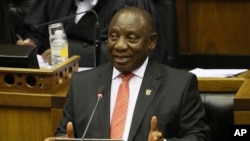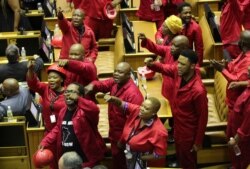South African President Cyril Ramaphosa barely got out the first sentence of his annual State of the Nation Address before the inevitable happened: commotion in the gallery, led by the Economic Freedom Fighters.
The far-left political party — easily identifiable in parliament by their resplendent red workmen’s outfits — had teased that they would raise a fuss over the nation’s struggling electricity company and the member of Cabinet they feel is responsible. They also protested the attendance at the speech of South Africa’s last apartheid president, FW De Klerk.
That commotion — which included yelling between party members and a Parliamentary officials — sucked up the first 90 minutes of the proceedings, culminating in National Assembly speaker Thandi Modise ordering them to leave.
'Our country is facing a stark reality’
When he finally took the podium to speak, on his fifth attempt to do so, Ramaphosa did not mince words about South Africa’s challenges.
"There are times when we have fallen short, there are times when we have made mistakes, but we remain unwavering in our determination to build a society that is free and equal and at peace,” he said, adding, “Our country is facing a stark reality.”
“Our economy has not grown at any meaningful rate for over a decade. Even as jobs are created, the rate of unemployment continues to deepen. The recovery of our economy has stalled as persistent energy shortages have disrupted businesses and also people's lives. Several state-owned enterprises are in distress and our public finances are under severe pressure. It is you, the people of South Africa, who carry this burden, confronted by rising living costs , unemployment , unable to escape , poverty, hopelessness, and unable to realize our potential as a people.”
He continued to tout his nation’s great resilience and achievements — pointing to the gallery, where sat the newly anointed Miss Universe, Zozibini Tunzi and the World-Cup-winning captain of the Springboks national rugby team, Siya Kolisi. Ramaphosa also vowed a number of measures, including improvements in education, health care, land distribution, agriculture, and government financing.
Ramaphoria fading?
But the chaos made clear that the so-called “Ramaphoria” that marked the beginning of his term may be beginning to fade. He was brought into the office in 2018, after leading an intra-party attempt to push out unpopular, scandal-ridden President Jacob Zuma. Zuma, whose lawyers say he is ill and seeking medical treatment abroad, leading him to miss the first session of his corruption trial this month, did not attend.
Ramaphosa also noted that South Africa’s role on the continent has changed as it took the helm of the African Union this year, saying, “we take up this responsibility at an important time for our continent. This year, the Africa Continental Free Trade Area agreement comes into effect. This is our moment as the people of the continent to give effect to the dreams of the founding fathers of African unity.”
He added, to applause, that South Africa would host a trade summit and another summit on reducing violence on the continent later this year.
But speech watchers said that behind Ramaphosa’s words lies concern over whether he can actually pull off any of these big ideas in this difficult political climate.
“Even if he's a man of great ideas and not a bad speech maker, he is struggling to get a lot of these ideas implemented and carried forward,” political studies professor Lawrence Hamilton, of the University of the Witwatersrand, told VOA moments after the speech ended.
“So obviously, it’s not a great sight and a kind of national embarrassment. But we've seen the EFF do this kind of thing quite a lot. So I think you can overemphasize it and read too much into it, because it is in part just a kind of political theater. But I think you could also say that it's a manifestation of how dislocated and frustrated, in particular, the youth of South Africa are.”





